Papers by Vanessa S. Tchamyou
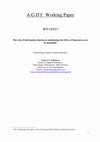
Forthcoming: Journal of African Business, 2018
This study examines the role of information sharing in modulating the effect of financial access ... more This study examines the role of information sharing in modulating the effect of financial access on income inequality in 48 African countries for the period 2004-2014. Information sharing is proxied with private credit bureaus and public credit registries. All dynamics of financial development are taken into account, namely: depth (money supply and liquid liabilities), efficiency (at banking and financial system levels), activity (from banking and financial system perspective) and size. The empirical exercise is based on interactive Generalised Method of Moments. It can be established from the findings that: first, a
threshold of 18.072 percentage coverage of public credit registries is needed to counteract the unconditional positive effect of banking system efficiency. Second, on the role of private credit bureaus in financial depth, both the unconditional and the conditional effects are
negative; implying a negative synergy. Overall, the findings show that, contingent on the type of financial development dynamic, credit registries broadly play their theoretical role of decreasing financing constraints in order to ultimately reduce inequality.
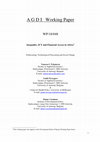
This study investigates the role of information and communication technology (ICT) on income ineq... more This study investigates the role of information and communication technology (ICT) on income inequality through financial development dynamics of depth (money supply and liquid liabilities), efficiency (at banking and financial system levels), activity (from banking and financial system perspectives) and size, in 48 African countries for the period 1996 to 2014. The empirical evidence is based on Generalised Method of Moments. While both financial depth and size are established to reduce inequality contingent on ICT, only the effect of financial depth in reducing inequality is robust to the inclusion of time invariant variables to the set of strictly exogenous variables. We extend the analysis by decomposing financial depth into its components, namely: formal, informal, semi-formal and non-formal financial sectors. The findings based on this extension show that ICT reduces income inequality through formal financial sector development and financial sector formalization as opposed to informal financial sector development and financial sector informalization. The study contributes at the same time to the macroeconomic literature on measuring financial development and responds to the growing field of addressing post-2015 Sustainable Development Goals (SDGs) inequality challenges by means of ICT and financial access.
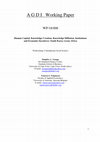
This article compares African countries to South Korea in terms of knowledge economy (KE). Emphas... more This article compares African countries to South Korea in terms of knowledge economy (KE). Emphasis is laid on human capital, knowledge creation, knowledge diffusion, institutions and economic incentives. The analytical approach consists of providing knowledge economy catch-up strategies that can be understood within the context of country-specific gaps between the frontier country in KE and laggard African countries. The empirical evidence is based on sigma convergence with data for the period 1996-2010. Overall, a KE diagnosis is provided by assessing KE gaps (between South Korea and specific-African countries) and suggesting compelling catch-up strategies with which to reduce identified gaps. Contemporary and non-contemporary policies from South Korea and more contemporary policies based on challenges of globalisation are discussed. The policy relevance of this inquiry aligns with the scholarly perspective that catch-up between South Korea and more advanced economies was accelerated by the former adapting to and assimilating relatively obsolete technological know-how from more developed nations.
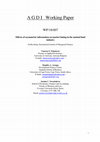
The paper investigates the effects of information asymmetry (between the realised return and the ... more The paper investigates the effects of information asymmetry (between the realised return and the expected return) on market timing in the mutual fund industry. For the purpose, we use a panel of 1488 active open-end mutual funds for the period 2004-2013. We use fund-specific time-dynamic betas. Information asymmetry is measured as the standard deviation of idiosyncratic risk. The dataset is decomposed into five market fundamentals in order to emphasis the policy implications of our findings with respect to (i) equity, (ii) fixed income, (iii) allocation, (iv) alternative and (v) tax preferred mutual funds. The empirical evidence is based on endogeneity-robust Difference and System Generalised Method of Moments. The following findings are established. First, information asymmetry broadly follows the same trend as volatility, with a higher sensitivity to market risk exposure. Second, fund managers tend to raise (cutback) their risk exposure in time of high (low) market liquidity. Third, there is evidence of convergence in equity funds. We may therefore infer that equity funds with lower market risk exposure are catching-up with their counterparts with higher exposure to fluctuation in market conditions. The paper complements the scarce literature on market timing in the mutual fund industry with time-dynamic betas, information asymmetry and an endogeneity-robust empirical approach.
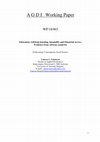
This study investigates the role of financial access in modulating the effect of education and li... more This study investigates the role of financial access in modulating the effect of education and lifelong learning on inequality in 48 African countries for the period 1996 to 2014. Lifelong learning is conceived and measured as the combined knowledge gained from primary through tertiary education while the three educational indicators are: primary school enrolment; secondary school enrolment and tertiary school enrolment. Financial development dynamics are measured with financial system deposits (liquid liabilities), financial system activity (credit) and financial system efficiency (deposits/credit). Three measures of inequality are employed notably: the Gini coefficient; the Atkinson index and the Palma ratio. The estimation strategy is based on Generalised Method of Moments. The following findings are established. First, primary school enrolment interacts with all financial channels to exert negative effects on the Gini index. Second, lifelong learning has negative net effects on the Gini index through financial deposit and efficiency channels. Third, for the most part, the other educational levels do not significantly influence inequality through financial access channels. Policy implications are discussed.
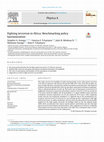
This study assesses the feasibility of policy harmonization in the fight against terrorism in 53 ... more This study assesses the feasibility of policy harmonization in the fight against terrorism in 53 African countries with data for the period 1980-2012. Four terrorism variables are used, namely: domestic, transnational, unclear and total terrorism dynamics. The empirical evidence is based on absolute beta catch-up and sigma convergence estimation techniques. There is substantial absence of catch-up. The lowest rate of convergence in terrorism is in landlocked countries for regressions pertaining to unclear terrorism (3.43% per annum for 174.9 years) while the highest rate of convergence is in upper-middle-income countries in domestic terrorism regressions (15.33% per annum for 39.13 years). After comparing results from the two estimation techniques, it is apparent that in the contemporary era, countries with low levels of terrorism are not catching-up their counterparts with high levels of terrorism. As a policy implication, whereas some common policies may be feasibly adopted for the fight against terrorism, the findings based on the last periodic phase (2004-2012) are indicative that country-specific policies would better pay-off in the fight against terrorism than blanket common policies. Some suggestions of measures in fighting transnational terrorism have been discussed in the light of an anticipated surge in cross-national terrorism incidences in the coming years.
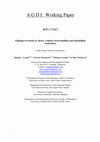
This study assesses government mechanisms in the fight against terrorism with particular emphasis... more This study assesses government mechanisms in the fight against terrorism with particular emphasis on the bundling and unbundling of ten governance dynamics. The empirical evidence is based on a panel of 53 African countries for period 1998-2012 and Generalized Method of Moments. The following findings are established. First, for the most part, political governance and its constituents respectively have negative effects on all terrorism dynamics, with the following consistent increasing order of negative magnitude: unclear terrorism, transnational terrorism, domestic terrorism and total terrorism. Second, overwhelmingly for economic and institutional governances, the governance dynamics and their constituent components affect terrorism negatively, with the magnitude on domestic terrorism consistently higher than that on transnational terrorism. Third, for most specifications, the effect of general governance is consistently negative on terrorism variables. Theoretical and practical policy implications are discussed.

This study assesses the knowledge economy (KE) performance of lagging African countries vis-à-vis... more This study assesses the knowledge economy (KE) performance of lagging African countries vis-à-vis their frontier counterparts with regard to the four dimensions of the World Bank’s knowledge economy index (KEI). The empirical exercise is for the period 1996-2010. It consists of first establishing leading nations before suggesting policy initiatives that can be implemented by sampled countries depending on identified gaps that are provided with the sigma convergence estimation approach. The following are established frontier knowledge economy countries. (i) For the most part, North African countries are dominant in education. Tunisia is overwhelmingly dominant in 11 of the 15 years, followed by Libya which is a frontier country in two years while Cape Verde and Egypt lead in a single year each. (ii) With the exception of Morocco that is leading in the year 2009, Seychelles is overwhelmingly dominant in ICT. (iii) South Africa also indomitably leads in terms of innovation. (iv) While Botswana and Mauritius share dominance in institutional regime, economic incentives in terms of private domestic credit are most apparent in Angola (8 years), the Democratic Republic of Congo (3 years) and Tanzania, Sierra Leone and Malawi (each leading in one year).
Using cross-country differences in the degree of isolation before the advent of technologies in s... more Using cross-country differences in the degree of isolation before the advent of technologies in sea and air transportation, we assess the relationship between geographic isolation and financial development across the globe. We find that pre-historic geographical isolation has been beneficial to development because it has contributed to contemporary cross-country differences in financial intermediary development. The relationship is robust to alternative samples, different estimation techniques, outliers and varying conditioning information sets.
The established positive relationship between geographic isolation and financial intermediary development does not significantly extend to stock market development.
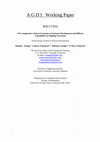
This study investigates the role of inclusive human development and military expenditure in fight... more This study investigates the role of inclusive human development and military expenditure in fighting terrorism in 53 African countries for the period 1998-2012. The empirical evidence is based on contemporary, non-contemporary and instrumental variable Fixed Effects regressions. Inclusive development is not a sufficient condition for the fight against terrorism whereas military expenditure can be effectively employed to mitigate the phenomenon. Significant negative effects are established only when endogeneity is accounted for by means of non-contemporary and instrumental-variables approaches. Hence, the policy effectiveness of employed tools is contingent on whether they are engaged proactively (i.e. non-contemporarily) or not. From the findings, the propensity of military expenditure to fight transnational terrorism is higher in: (i) middle income countries vis-à-vis their low income counterparts; (ii) oil-rich countries compared to oil-poor countries and (iii) Christian-dominated countries vis-à-vis their Islam-oriented counterparts. Furthermore military expenditure is also more effective at combating domestic and transnational terrorism in: (i) North African countries vis-à-vis their sub-Saharan Africa counterparts; (ii) landlocked countries compared to countries that are open to the sea and (iii) politically-stable countries vis-à-vis their politically-unstable counterparts. Contributions to the comparative economics are discussed. Practical and theoretical contributions are also provided.
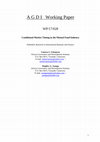
This study complements the scarce literature on conditional market timing in the mutual fund indu... more This study complements the scarce literature on conditional market timing in the mutual fund industry by assessing determinants of market timing throughout the distribution of market exposure. It builds on the intuition that the degree of responsiveness by fund managers to investigated factors (aggregate liquidity, information asymmetry, volatility and market excess return) is contingent on their levels of market exposure. To this end, we use a panel of 1467 active open-end mutual funds for the period 2004-2013. Fund-specific time-dynamic beta is employed and we avail room for more policy implications by disaggregating the dataset into market fundamentals of: equity, fixed income, allocation and tax preferred. The empirical evidence is based on Quantile regressions. The following findings are established. First, there is consistent positive threshold evidence of volatility and market return in market timing, with the slim exception of allocation funds for which the pattern of volatility is either U- or S-shaped. Second, the effect of volatility and market return are consistently positive and negative respectively in the bottom and top quintiles of market exposure, but for allocation funds. Third, the effects of information asymmetry and aggregate liquidity are positive and negative, contingent on specifications, level of market exposure and market fundamentals. The findings broadly suggest that blanket responses of market exposures to investigated factors are unlikely to represent feasible strategies for fund managers unless they are contingent on initial levels of market exposure and tailored differently across ‘highly exposed’-fund managers and ‘lowly exposed’-fund managers. Implications for investors and fund managers are discussed.
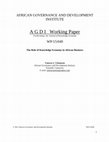
This paper assesses the role of knowledge economy (KE) in African business in 53 countries for th... more This paper assesses the role of knowledge economy (KE) in African business in 53 countries for the period 1996-2010. The four KE components of the World Bank are employed, notably: education, innovation, economic incentives & institutional regime and information & communication technology. The business indicators are classified into: starting, doing and ending business. Principal components analysis and panel instrumental variable fixed effect approaches are employed as empirical strategies. The findings which are broadly consistent with intuition and the predictions of economic theory suggest that KE policies will substantially boost the starting and doing of business in Africa. This is relevant in fighting unemployment and improving African competitiveness in global value chains. Policy implications for the relevance of each specific KE dimension in African business are discussed with particular emphasis on the theoretical underpinnings of the study. The investigation is original in its contribution at the same time to the scarce literature on African KE and the growing challenges of improving the business climate of the continent by means of KE.
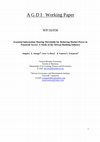
This study investigates the role of information sharing offices (public credit registries and pri... more This study investigates the role of information sharing offices (public credit registries and private credit bureaus) in reducing market power for financial access in the African banking industry. The empirical evidence is based on a panel of 162 banks from 42 countries for the period 2001-2011. Three simultaneity-robust empirical strategies are employed, namely: (i) Two Stage Least Squares with Fixed Effects in order to account for simultaneity and the observed heterogeneity; (ii) Generalised Method of Moments (GMM) to control for simultaneity and time-invariant omitted variables and (iii) Instrumental Variable Quantile regressions to account for simultaneity and initial levels of financial access. In order to ensure that information sharing offices influence market power for loan price (quantity) to decrease (increase), public credit registries should have between 3.156% and 3.3% coverage, while private credit bureaus should have between 1.443 and 18.4% coverage. The established thresholds are cut-off points at which information sharing offices completely neutralise the negative effect of market power on financial access. The thresholds are contingent on the dimension (loan price versus loan quantity) and distribution (conditional mean versus conditional distribution) of financial access.
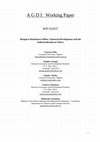
The paper assesses how remittances directly and indirectly affect industrialisation in a panel of... more The paper assesses how remittances directly and indirectly affect industrialisation in a panel of 49 African countries for the period 1980-2014. The indirect impact is assessed through financial development channels. The empirical evidence is based on three interactive and non-interactive simultaneity-robust estimation techniques, namely: (i) Instrumental Fixed Effects (FE) to control for the unobserved heterogeneity; (ii) Generalised Method of Moments (GMM) to control for persistence in industrialisation and (iii) Instrumental Quantile Regressions (QR) to account for initial levels of industrialisation. The non-interactive specification elucidates direct effects of remittances on industrialisation whereas interactive specifications explain indirect impacts. The findings broadly show that for certain initial levels of industrialisation, remittances can drive industrialisation through the financial development mechanism. Policy implications are discussed.
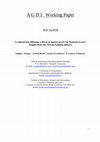
This study assesses how information diffusion dampens the adverse effect of market power on the p... more This study assesses how information diffusion dampens the adverse effect of market power on the price and quantity of loans provided by a panel of 162 banks from 39 African countries for the period 2001-2011. The empirical evidence is based on three endogenity-robust estimation techniques, namely: (i) Two Stage Least Squares (2SLS), (ii) Generalised Method of Moments (GMM) and (iii) Instrumental Variable Quantile Regressions (QR). Three key results emerge. First, from the GMM results, a mobile phone penetration rate of 54.29, rising to 57 per 100 people are predicted to neutralise the adverse effect of market power on the average loan price and quantity respectively. Second, from the QR, mobile phone penetration rates of 56.20, 52.04 and 42.76 per 100 people is needed to nullify the negative effect of market power on loan quantity at the 0.10th, 0.25th and 0.90th quintiles respectively. Third, a considerably lower internet penetration rate of 9.49 per 100 people is required to counteract the negative impact of market power on loan quantity at the 0.90th quintile.
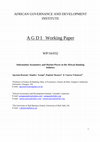
This study investigates the role of information sharing offices and its association with market p... more This study investigates the role of information sharing offices and its association with market power in the African banking industry. The empirical evidence is based on a panel of 162 banks from 42 countries for the period 2001-2011. Five simultaneity-robust estimation techniques are employed, namely: (i) Two Stage Least Squares; (ii) Instrumental Fixed effects to control for the unobserved heterogeneity; (iii) Instrumental Tobit regressions to control for the limited range in the dependent variable; (iv) Generalised Method of Moments (GMM) to control for persistence in market power and (v) Instrumental Quantile Regressions (QR) to account for initial levels of market power.
The following findings have been established from non-interactive regressions. First, the effects of information sharing offices are significant in Two Stage Least Squares, with a positive effect from private credit bureaus. Second, in GMM, public credit registries increase market power. Third, from Quintile Regressions, private credit bureaus consistently increase market power throughout the conditional distributions of market power.
Given that the above findings are contrary to theoretical postulations, we extended the analytical framework with interactive regressions in order to assess whether the anticipated effects can be established if information sharing offices are increased. The extended findings show a: (i) negative net effect from public credit registries on market power in GMM regressions and; (ii) negative net impacts from public credit registries on market power in the 0.25th and 0.50th quintiles of market power.
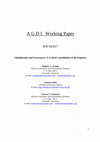
This study assesses the effect of globalisation on governance in 51 African countries for the per... more This study assesses the effect of globalisation on governance in 51 African countries for the period 1996-2011. Ten bundled and unbundled governance indicators and four globalisation variables are used. The empirical evidence is based on Generalised Method of Moments. The following findings are established. First, on political governance, only social globalisation improves political stability while only economic globalisation does not increase voice & accountability and political governance. Second, with regard to economic governance: (i) only economic globalisation significantly promote regulation quality; (ii) social globalisation and general globalisation significantly advance government effectiveness and (iii) economic globalisation and general globalisation significantly promote economic governance. Third, as concerns institutional governance, whereas only social globalisation improves corruption-control, the effects of globalisation dynamics on the rule of law and institutional governance are not significant. Fourth, the impacts of social globalisation and general globalisation are positive on general governance. It follows that: (i) political governance is driven by voice and accountability compared to political stability; (ii) economic governance is promoted by both regulation quality and government effectiveness from specific globalisation angles and (iii) globalisation does not improve institutional governance for the most part. Theoretical contributions and policy implications are discussed.
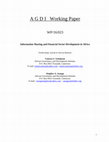
This study investigates the effect information sharing has on financial sector development in 53 ... more This study investigates the effect information sharing has on financial sector development in 53 African countries for the period 2004-2011. Information sharing is measured with private credit bureaus and public credit registries. Hitherto unexplored dimensions of financial sector development are employed, namely: financial sector dynamics of formalization, informalization and non-formalization. The empirical evidence is based on Ordinary Least Squares (OLS) and Generalised Method of Moments (GMM). The following findings are established. Information sharing bureaus increase (reduce) formal (informal/non-formal) financial sector development. In order to ensure that information sharing bureaus improve (decrease) formal (informal/non-formal) financial development, public credit registries should have between 45.45 and 50 percent coverage while private credit bureaus should have at least 26.25 percent coverage.
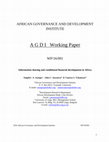
This study examines conditional financial development from information sharing in 53 African coun... more This study examines conditional financial development from information sharing in 53 African countries for the period 2004-2011, using contemporary and non-contemporary quantile regressions (QR) which enable the assessment of the effect of information sharing throughout the conditional distributions of financial development dynamics. The policy relevance of the QR approach builds on the motivation that blanket policies on the role of information sharing in financial development may not be effective unless they are contingent on initial levels of financial development and tailored differently across countries with low, intermediate and high levels of financial development. Information sharing is measured with private credit bureaus (PCB) and public credit registries (PCR) while financial development is proxied with dynamics of depth, efficiency, activity and size. The following findings are established. First, for financial depth, while there is a positive threshold effect from PCR in money supply and liquid liabilities, the effect from PCB is mixed. Second, for financial efficiency, there is a: (i) contemporary positive threshold from PCR and mixed effect from PCB in banking system efficiency and (ii) U-shape and positive threshold from PCR and PCB respectively in financial system efficiency. Third, for financial activity, there are consistent positive thresholds from PCR and PCB in banking system activity and financial system activity. Fourth, there are negative thresholds from PCR and PCB in financial size. Positive thresholds are consistent incremental financial development rewards from PCR and/or PCB with increasing financial development and vice-versa for negative thresholds. Mixed effects are characterised by S-shaped, Kuznets or wave-like patterns. As a main policy implication, initial conditions in financial development are essential to materialise incremental benefits from PCR and PCB. Other policy implications are discussed.

SSRN Electronic Journal, 2000
This study unites two streams of research by simultaneously focusing on the impact of financial g... more This study unites two streams of research by simultaneously focusing on the impact of financial globalisation on financial development and pre- and post-crisis dynamics of the investigated relationship. The empirical evidence is based on 53 African countries for the period 2004-2011 and Generalised Method of Moments. The following findings are established. First, whereas marginal effects from financial globalisation are positive on financial dynamics of activity and size, corresponding net effects (positive thresholds) are negative (within range). Second, while decreasing financial globalisation returns are apparent to financial dynamics of depth and efficiency, corresponding net effects (negative thresholds) are positive (not within range). Third, financial development dynamics are more weakly stationary and strongly convergent in the pre-crisis period. Fourth, the net effect from the: pre-crisis period is lower on money supply and banking system efficiency; post-crisis period is positive on financial system efficiency and pre-crisis period is positive on financial size. Policy implications are discussed.







Uploads
Papers by Vanessa S. Tchamyou
threshold of 18.072 percentage coverage of public credit registries is needed to counteract the unconditional positive effect of banking system efficiency. Second, on the role of private credit bureaus in financial depth, both the unconditional and the conditional effects are
negative; implying a negative synergy. Overall, the findings show that, contingent on the type of financial development dynamic, credit registries broadly play their theoretical role of decreasing financing constraints in order to ultimately reduce inequality.
The established positive relationship between geographic isolation and financial intermediary development does not significantly extend to stock market development.
The following findings have been established from non-interactive regressions. First, the effects of information sharing offices are significant in Two Stage Least Squares, with a positive effect from private credit bureaus. Second, in GMM, public credit registries increase market power. Third, from Quintile Regressions, private credit bureaus consistently increase market power throughout the conditional distributions of market power.
Given that the above findings are contrary to theoretical postulations, we extended the analytical framework with interactive regressions in order to assess whether the anticipated effects can be established if information sharing offices are increased. The extended findings show a: (i) negative net effect from public credit registries on market power in GMM regressions and; (ii) negative net impacts from public credit registries on market power in the 0.25th and 0.50th quintiles of market power.
threshold of 18.072 percentage coverage of public credit registries is needed to counteract the unconditional positive effect of banking system efficiency. Second, on the role of private credit bureaus in financial depth, both the unconditional and the conditional effects are
negative; implying a negative synergy. Overall, the findings show that, contingent on the type of financial development dynamic, credit registries broadly play their theoretical role of decreasing financing constraints in order to ultimately reduce inequality.
The established positive relationship between geographic isolation and financial intermediary development does not significantly extend to stock market development.
The following findings have been established from non-interactive regressions. First, the effects of information sharing offices are significant in Two Stage Least Squares, with a positive effect from private credit bureaus. Second, in GMM, public credit registries increase market power. Third, from Quintile Regressions, private credit bureaus consistently increase market power throughout the conditional distributions of market power.
Given that the above findings are contrary to theoretical postulations, we extended the analytical framework with interactive regressions in order to assess whether the anticipated effects can be established if information sharing offices are increased. The extended findings show a: (i) negative net effect from public credit registries on market power in GMM regressions and; (ii) negative net impacts from public credit registries on market power in the 0.25th and 0.50th quintiles of market power.